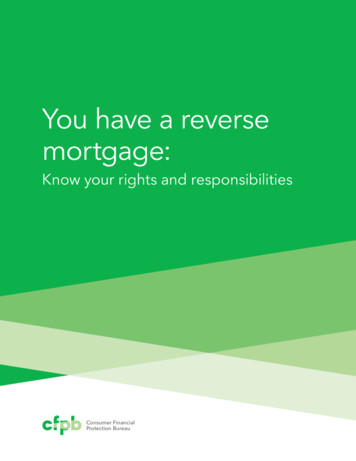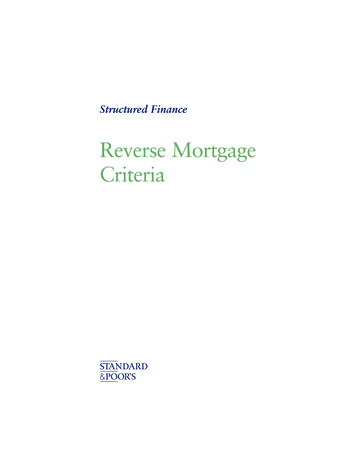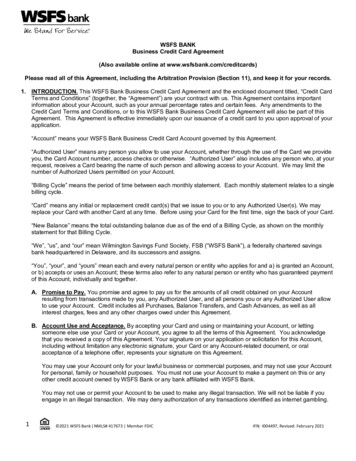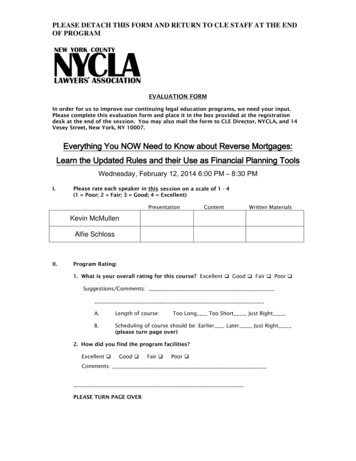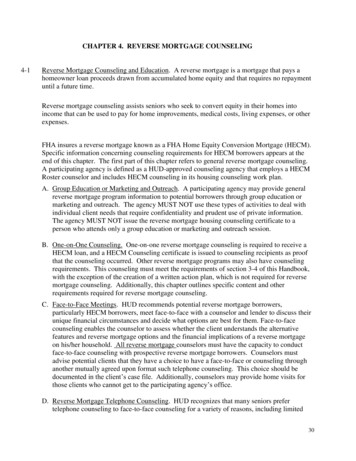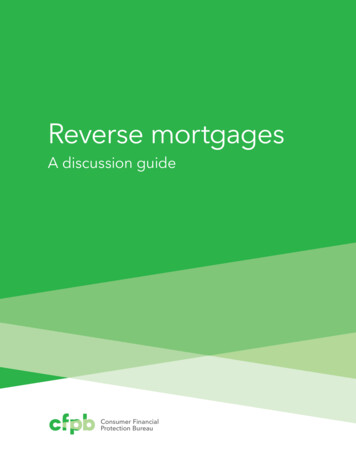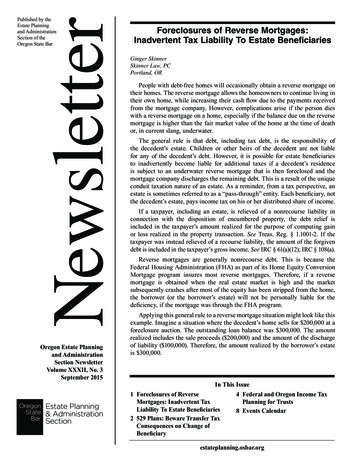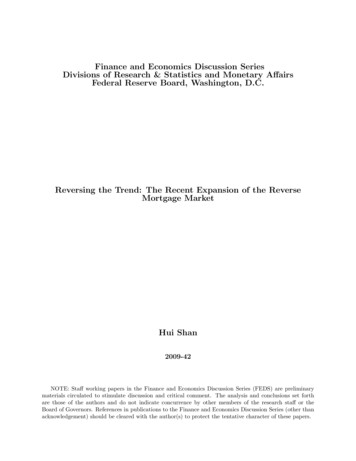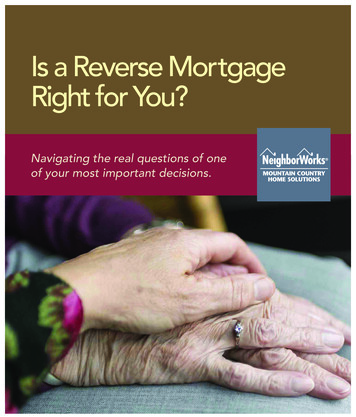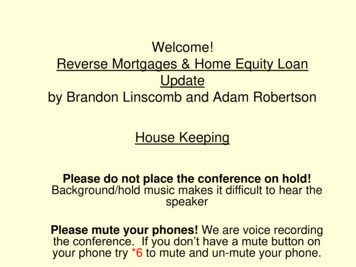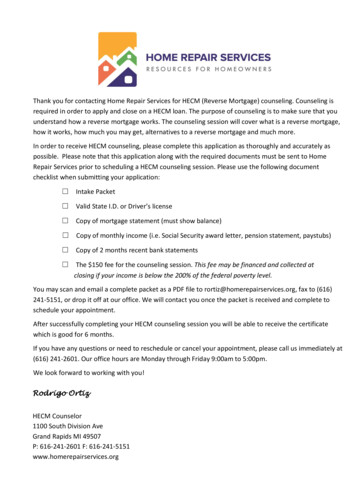
Transcription
REVERSE MORTGAGEINFORMATION GUIDE
As you plan for or enter your retirement years,a WSFS Bank reverse mortgage is a powerfulfinancial tool that can meet your needs fortoday and tomorrow.Tens of thousands of homeowners age 62 andolder across the nation are already enjoyingthe benefits of a reverse mortgage. It can be akey component of a well-balanced retirementplan, providing seniors with extra cash to livea more fulfilling and secure life. With built-ingovernment safeguards, it’s also a financialtool you can use with confidence.With a WSFS Bank Reverse Mortgage, you canmake the most of your retirement years withgreater independence and peace of mind.IntroductionThis booklet explains the features and benefits of a type of reversemortgage that is insured by the U.S. Government known as the HomeEquity Conversion Mortgage. A reverse mortgage is a unique loanspecifically for homeowners who are age 62 and older. It enables themto access the money they have built up as equity in their homes whilethey continue to live in their home. These seniors enjoy the benefitsof having their home pay them back for all the years they spentpaying their mortgage.Reverse mortgages are primarily designed to strengthen seniors’personal and financial independence by providing funds without amonthly payment burden while living in their own home. If you area homeowner age 62 and older, you might be interested in talkingwith a WSFS Reverse Mortgage Loan Officer or a U.S. Department ofHousing and Urban Development (HUD) counselor about a reversemortgage. Learn how you can create a steady flow of tax-free* incomefrom a significant source of ready cash, all while you continue livingin your home. And, you don’t repay any part of the loan as long as youoccupy your home and continue to meet any terms and conditionsof the reverse mortgage.* Consult your tax advisor to determine if a reverse mortgage will affect your tax status.Generally, the proceeds are tax free and do not affect Medicare or Social Security benefits.1
Assessing your financial needsAs a homeowner who has successfully managed your finances overthe years, you understand much of the financial planning process.If, on the other hand, you are managing your own finances for thefirst time, it is important that you take a moment to review this section.It will give you some important points to address, and some practicaltips, as you consider a reverse mortgage.Fannie Mae, in support of its corporate mission toincrease the affordability of housing for low-to-moderateand middle-income Americans, works with variousgovernment, local, and social agencies, as well as banksincluding WSFS Bank, to assist older homeownersto remain in their homes and obtain needed cash.Fannie Mae is the investor of the reverse mortgage.There are other reverse mortgage options availableFinancial planning simply involves some careful thought about yourfinancial goals, the patience and willingness to compile complete dataon your current financial condition, and a little planning to estimatewhat you will need to meet your goals.A WSFS Bank Reverse Mortgage Loan Officer will help you make a moreinformed decision about obtaining a reverse mortgage. You should includediscussing the reverse mortgage with the people you feel comfortablewith, including family members, friends, and trusted support groups(churches, social service agencies, etc.). You may also want to speakwith your accountant, legal and tax advisor and/or financial planner.A non-profit reverse mortgage counseling agency also can help guideyou through the process.as well. We would encourage you and your family toSetting your financial goalsmeet with a WSFS Bank Reverse Mortgage Loan OfficerTo make an informed decision about reverse mortgages, you needto identify your financial goals. In this way, you can better determineif this financial tool will help you achieve your goals.for a free consultation to discuss the options that bestsuit your current financial and life situation, as well asyour estate planning goals.2REVERSE MORTGAGE INFORMATION GUIDE3
Clearly defined financial goals give you objectives to work toward andguidelines to evaluate the best means of getting there. Start by thinkingabout your needs and wants, both now and for the future. Then, askyourself some basic questions like these: Do you enjoy good health or do you need special medical care? Are your finances fairly secure or are you struggling to pay forbasic necessities? Do you plan to remain in your home for life, or to relocate at a futuretime (for example, to live with relatives or in some other housingarrangement)? Do you need added income to pay for immediate expenses or tooffset a recent change in your financial situation, such as retirementor living alone? Do you need funds to cover a current short-term drain on your cash flow,to supplement your regular monthly income, to provide for emergenciesand contingencies, or for a combination of reasons?4REVERSE MORTGAGE INFORMATION GUIDE Do you or your significant other need in-home care? Are you thinking about long-term care insurance? How long do you plan to stay in your home? If you plan to move in fiveor ten years, where would you like to go?Thinking about the answers to these and similar questions will help youclarify your goals and will put you in a better position to decide the bestway to achieve them.5
REVERSE MORTGAGECOMMONLY ASKED QUESTIONSHow is a reverse mortgage differentfrom a traditional mortgage?With a traditional mortgage, home equity loan or line of credit, you mustmake regular monthly payments to the lender to repay the loan. In orderto qualify for any of these loans, you must have sufficient funds to makethe monthly loan payments. In addition, if you fail to make the monthlypayments a mortgage lender can foreclose, forcing you to sell your hometo repay the loan.What is a reverse mortgage?The reverse mortgage is designed by HUD and insured by the FederalHousing Administration (FHA) to give older homeowners a safe vehiclefor converting the equity in their homes to cash.Reverse mortgages are called so because instead of making mortgagepayments, the borrower actually receives money from the lender.The reverse mortgage allows you to tap into your home equity and receiveyour loan proceeds according to a payment plan that you select–whetherit is a lump sum to pay an unexpected hospital bill, or a stream of regularpayments to supplement your monthly income. Unlike the loan balanceof a conventional mortgage, which becomes smaller with each monthlypayment, the loan balance of a reverse mortgage grows larger over time.The loan principal increases with each payment that you receive, andinterest and other charges accrue each month only on the total fundsadvanced to you to date.In contrast, reverse mortgages donot require monthly repaymentsto the lender. In fact, repayment ofthese loans is not required as longas your home remains your principalresidence and you remain currentin paying your property taxes andhazard insurance charges. In addition,your income is not a factor in qualifyingfor these loans, nor are you requiredto re-qualify each year.You must continue to pay your property taxes, hazard insurance charges,and maintain the property. No repayment of the reverse mortgage isrequired until you sell or permanently leave the property.6REVERSE MORTGAGE INFORMATION GUIDE7
Is a reverse mortgage “financially” safe?What are the eligibility requirements?A significant feature of the reverse mortgage is that it is insured underthe U.S. government’s Federal Housing Administration (FHA) insuranceprogram. This program ensures that you will receive all payments due toyou as long as you live in your home. The FHA insurance premiums thatyou pay as a borrower create a reserve fund to cover any losses that mightoccur. It also protects borrowers and lenders against the risk that the loanbalance might, at some time, exceed the value of the home. This meansthat as long as you continue to occupy your property as your principalresidence, you cannot be forced to sell or vacate your home. Additionally,a non-borrowing spouse may remain in the home even after theirborrowing spouse has passed. You or your estate will never owe more thanyour loan balance or the value of your property–whichever is lower–andno assets other than your home must be used to repay your debt, becausethe FHA insurance covers any further financial obligation to the lender.The eligibility requirements for a reverse mortgage are quite simpleand do not impose any minimum or maximum limits on income:FHA insurance also protects you against the possibility of lender default.Should your lender fail to make payments to you as agreed in the loan,the FHA will continue making loan advances directly to you.8WSFS BANK REVERSE MORTGAGE PROGRAM You, and any of your co-borrowers, must be at least 62 years oldand occupy the property as your principal residence. Your property must be either a one- to four-unit dwelling or a unitin a condominium or planned unit development (PUD) project.Leasehold properties are eligible if they meet HUD and Fannie Maeguidelines. The property need not be debt-free for the borrower tobe eligible, but the indebtedness on an existing lien must be paidoff at closing. Manufactured housing may be eligible if the propertymeets FHA requirements. Loans secured by property held in aninter vivos trust, or living trust, are considered eligible if the trustand the borrowers meet HUD requirements. A WSFS Bank ReverseMortgage Loan Officer can help you determine whether a particulartrust agreement is eligible. All reverse mortgage borrowers must have reverse mortgagecounseling from a HUD-approved counseling agency. This sessionmay be conducted with a power of attorney or court-appointedconservator/guardian if the borrower lacks legal competency.The counseling session will focus on the types of reverse mortgagesavailable, the suitability, costs associated with, and otherservices available.9
How much can I borrow?How are the loan proceeds paid to me?The maximum amount you can borrow (your “principal limit”)is based on a formula that considers two factors:With a reverse mortgage, you receive your loan proceeds according toyour choice of these possible payment plans alone or in combination:1. The age of the youngest borrower is a consideration because thelonger your actual life expectancy, the longer monthly advanceswill be expected to be paid to you and the longer that servicingfees, mortgage insurance premiums, and interest will be chargedto your loan balance.Tenure – You receive equal monthly payments for as long as you occupyyour home as your principal residence. Your payments do not increaseor decrease and you continue to receive them until you sell your home,convey title, or permanently move away. Monthly payments with atenure payment plan are smaller than with a term plan, however thepayments continue for as long as you live in your home.2. The maximum loan amount is determined by the value andlocation of the property. Your WSFS Bank Reverse MortgageLoan Officer will be able to calculate the amount of your reversemortgage during your initial free consultation. You could also goto www.wsfsbank.com/reversemortgage and use the reversemortgage calculator.10REVERSE MORTGAGE INFORMATION GUIDETerm – You receive monthly payments for a specified time period.A term plan may be a good choice if you need extra monthly incomefor a fixed time period–for example, to pay for temporary or extendedhome health care, or to “tide you over” until you are ready to sell yourhome and move into group housing or relocate to another community.With a term payment plan, your monthly payments are generallyhigher than with the tenure plan. If you choose a term payment plan,keep in mind that when the term ends, your monthly payments stop.You will need to plan ahead to determine what you will do at the endof that term. Although you will no longer receive monthly payments,you will not have to repay your reverse mortgage until you no longerlive in your home. However, as long as you remain in your home, youwill still be responsible to maintain your property and for paying alltaxes and insurance.11
Draws on a line of credit – You can establish a line of credit equal toyour net principal limit. You can request a loan advance of any amount–up to the net principal limit–whenever you need it, as long as you occupyyour home as your principal residence. Interest is not charged on the lineof credit until you make a draw, and then only against the amount thathas been drawn. When your loan becomes due and payable, you willpay the lesser of the loan balance or the appraised value of the property.Any unused portion of the line of credit will not be included in the loanbalance and will not be available after the loan is paid.Payment plan flexibility – The reverse mortgage is unique in theflexibility in payment plans it offers borrowers. In addition to having thepreviously stated options to choose from, you may change paymentplans at any time and as many times as you wish. You may also receivea lump sum at closing to repay the remainder of your old mortgage, torepair or improve your home, or for other needs at closing.This flexibility allows you to reshape your payment plan as yourcircumstances change. If you decide to change payment plans, youdo not have to pay any new loan origination fees or closing costs.The only cost is an administrative charge each time a change isrequested.How is my monthly income amount determined?The amount of your monthly income depends on two factors:Your principal limit (See “How much can I borrow” previously in thisbooklet) and the length of time you will receive payments.The length of time you will receive payments is estimated by consideringyour age and life expectancy, and the term of your payment plan, whethera fixed period of time or your expected tenure in your home.The longer the fixed term or the younger you are, the more monthlypayments you will receive and the smaller the monthly payment will be.The shorter the fixed term or the older you are, you will receive fewerpayments, however, the monthly payment will be a larger amount.12REVERSE MORTGAGE INFORMATION GUIDE13
What interest rates are available?What fees are charged?With a reverse mortgage, you have a choice of two applied interest rates:a fixed rate and an adjusting rate that could change annually or monthly.The basic charges (other than interest) on a reverse mortgage include:The applied interest rate, or initial rate, is the rate at which interest ischarged to your loan balance. Once the interest rate adjustment periodhas been established at closing, it cannot be changed. Rates for theadjustable reverse mortgage are tied to the average of the one month orone year LIBOR index, as published in the Wall Street Journal. Adjustableinterest rates (also called “variable rates”) can be adjusted within aspecified range and time, and vary according to changes in a specifiedprice index. Adjustable rates on mortgages are usually tied to a publishedmarket rate of interest.For your protection, both the annually adjusting and the monthlyadjusting rates have interest rate caps that are regulated by theFederal government.A change in the adjustable rate has no effect on the amount or numberof loan advances you receive, but causes the loan balance to grow at afaster or slower rate. The lower the rate, the slower your loan balancegrows, and vice versa.14REVERSE MORTGAGE INFORMATION GUIDEAn origination fee is charged to cover the lender’s costs in preparingyour initial loan application and processing the loan. HUD now caps theamount of this fee and also permits the borrower to finance the entireamount of the fee. The borrower does not pay any additional originationfees of any kind to a mortgage broker or loan correspondent.Initial and monthly mortgage insurance premiums that protectthe lender against the risk that your loan balance might at some timeexceed the value of your home. This is the FHA insurance stated earlier.The mortgage insurance premiums on reverse mortgages consist of twotypes of charges: a one-time premium at closing of your maximum claimamount and annual premiums on your mortgage loan balance.The one-time insurance premium must be paid when you take outyour loan and may be financed as part of the loan. The annual insurancepremium is divided by 12 and is charged monthly to your loan balance.The borrower can either pay this amount in cash or finance the entireamount. Keep in mind that any loan costs that are financed will earninterest over the life of the loan.15
Other possible costs may include a credit report, document preparation,recording fees, endorsement, escrow/settlement fee, termite inspection,flood zone certification, attorney’s fees and title exam, which can all befinanced. Should you not close on your loan, you will be responsible forany costs incurred.Total loan costs. When deciding to obtain a reverse mortgage, you willwant to consider its total cost, not just the interest rate charged to theloan balance. As your lender, WSFS Bank must disclose the total cost ofthe loan to you at the time of application.When do I repay the loan?With all reverse mortgage payment plans, you have the security ofknowing that your reverse mortgage is not due and payable until the lastsurviving borrower permanently vacates the property, as long as youmaintain your property, pay your property taxes and hazard insurance,and abide by your loan agreement.It may also become due and payable only with HUD approval if you orthe last surviving borrower do not occupy the property as your principalresidence for more than 12 consecutive months.Under such circumstances, before you would be required to repay the loan,you would usually be referred to a HUD counselor to see if you could worktogether to find a solution to the problem.How do I repay the loan?When you meet with your WSFS Bank Reverse MortgageLoan Officer, they will evaluate your situation and makesure you know which fees you will be responsible forand how they will be funded.16REVERSE MORTGAGE INFORMATION GUIDEWhen your loan balance is due, it must be repaid in one payment–eitherfrom the proceeds of the sale of your home or in other ways. For example,you might cash in assets other than your home to pay off the loan; or yourheirs might use their own funds or funds from your estate rather thanselling the home; or they might take out a conventional mortgage onthe home and pay off the reverse mortgage with those funds. However,it is important for you to know that the amount you owe can never exceedthe market value of the home at the time of payoff. This means that thesale of the home will always satisfy the loan and your lender cannotrequire repayment from your heirs or from any other assets. Any salesproceeds in excess of the amount owed to the lender belong to you oryour estate. These mortgages have neither a fixed maturity date nor afixed mortgage amount.17
Can I make partial payments on my loan?You may prepay all or part of the outstanding balance at any timewithout penalty. Repayment in full will terminate the loan agreement.A borrower may choose to make a partial prepayment to preservemore of the equity in the property, or to increase monthly payments,if a payment plan with monthly payments was selected. By reducingthe outstanding balance, the borrower increases the amount available.Will a reverse mortgage affectother benefits that I receive?Your reverse mortgage offers you some unique benefits such as theincome you receive is tax-free. We do recommend that you discuss thiswith your tax advisor.Also, the income that you receive will not affect your Social Securityor Medicare eligibility or benefits because these programs are notbased on need.If you receive Supplemental Security Income (SSI) or Medicaidbenefits, both of which are based on need, these benefits may beaffected by your reverse mortgage payments. To determine if thiswould affect your particular situation, you must consult your localoffices for SSI, Medicaid, and other programs from which you receivebenefits, or a Loan Officer in such benefits through your local AreaAgency on Aging or nearest legal services office.18REVERSE MORTGAGE INFORMATION GUIDEWhat if I change my mind?Federal law provides you a three-day “right of rescission,” that is, theoption to cancel the contract without penalty within three business daysafter your loan closing (including Saturdays). Your loan proceeds are notpaid to you until after the end of this period, and interest charges do notstart to accrue until the day after you receive the funds.Where can I apply for a reverse mortgage?WSFS Bank has been a trusted part of the Delaware and Pennsylvaniacommunities for nearly 200 years. Our Mortgage Loan Officers areexperienced in the business and have a complete understanding ofthis unique product for homeowners 62 years of age or older who arelooking to make the most of their retirement years. Plus you get theadvantage of working with people you know and trust people inyour community.19
How a WSFS Bank Reverse Mortgagecan help you: Allows you to stay inyour home and retainthe title Eliminates monthlymortgage payments Enables you to use thecash any way you want Gives you the choice ofa lump sum, line of credit,or a combinationGet the facts about reverse mortgages.For more information about how we can be of service to you, pleasecontact WSFS Mortgage at info@wsfsmortgage.com or by calling directly at888-992-7729. You can also stop by one of our convenient banking offices.You can also visit us online at wsfsbank.com/reversemortgage Provides a cushion againstthe unexpected Funds home repairs Establishes a resourceto help grandchildrenand loved ones Helps pay off existing debt Funds medical expensesand/or long-termcare insurance Pays for home services Helps you to enjoyadditional leisure activities Provides easy accessto the equity you havebuilt in your home Delivers increasedtax-free*cash Provides funds to improveyour quality of life Does not affect Medicareor Social Security benefits* Consult your tax advisor to determine if a reverse mortgage will affect your tax status.Generally, the proceeds are tax free and do not affect Medicare or Social Security benefits.20REVERSE MORTGAGE INFORMATION GUIDE21
To learn more please contact ourReverse Mortgage Department or visitwsfsbank.com/reversemortgageWSFSMOR TGAGE.C OM / 1.888.992.7 729 2019 WSFS Bank Member FDIC ǀ NMLS #417673
A WSFS Bank Reverse Mortgage Loan Officer will help you make a more informed decision about obtaining a reverse mortgage. You should include discussing the reverse mortgage with the people you feel comfortable with, including family members, friends, and trusted support groups (churches, social service agencies, etc.). You may also want to speak
